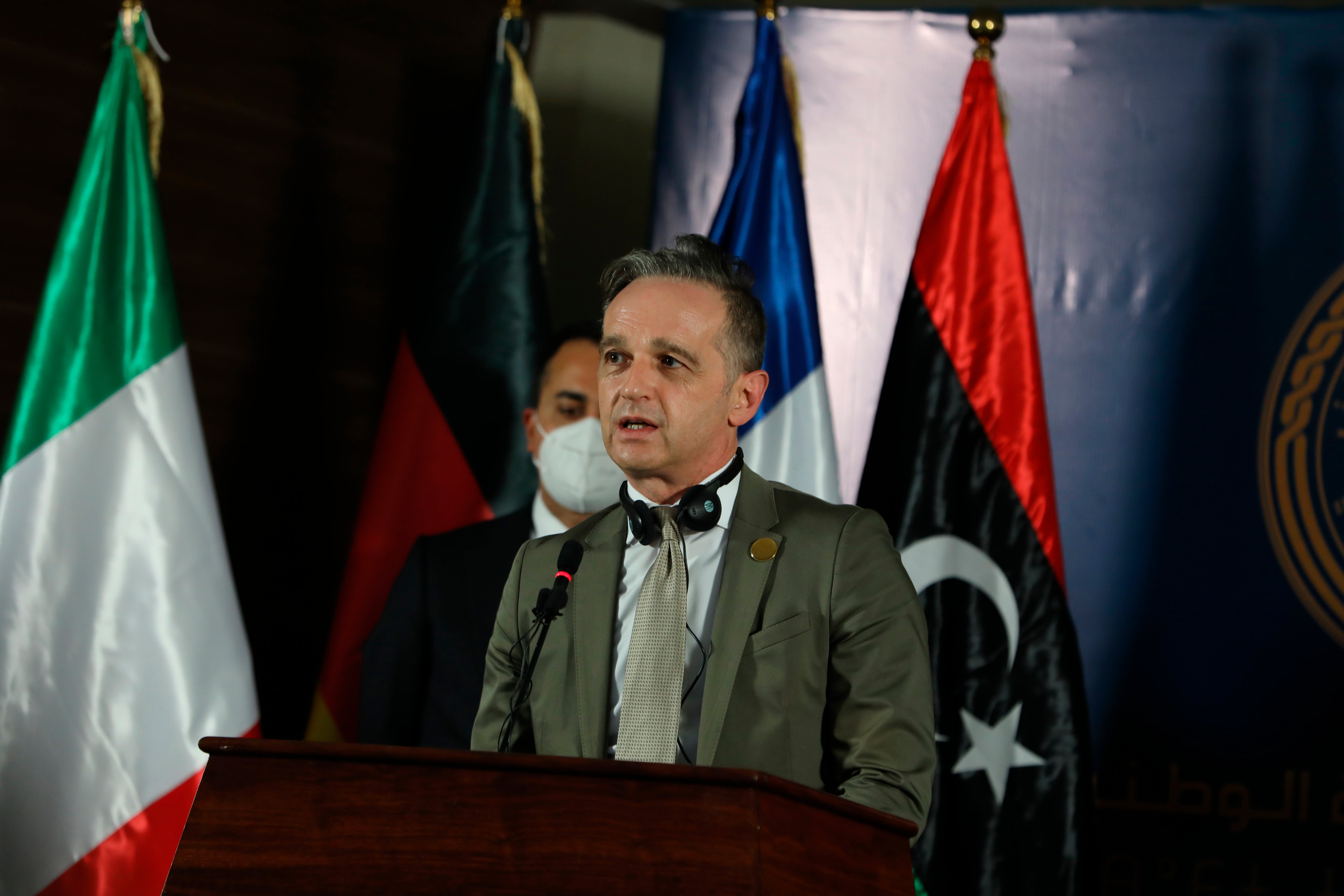EU top diplomats in Libya to support interim authorities
The foreign ministers of France, Italy and Germany have met with with Libya’s newly elected transitional authorities to show their support

Your support helps us to tell the story
From reproductive rights to climate change to Big Tech, The Independent is on the ground when the story is developing. Whether it's investigating the financials of Elon Musk's pro-Trump PAC or producing our latest documentary, 'The A Word', which shines a light on the American women fighting for reproductive rights, we know how important it is to parse out the facts from the messaging.
At such a critical moment in US history, we need reporters on the ground. Your donation allows us to keep sending journalists to speak to both sides of the story.
The Independent is trusted by Americans across the entire political spectrum. And unlike many other quality news outlets, we choose not to lock Americans out of our reporting and analysis with paywalls. We believe quality journalism should be available to everyone, paid for by those who can afford it.
Your support makes all the difference.The foreign ministers of France, Italy and Germany met with Libyan officials Thursday to show support for the country's newly elected transitional authorities, who are expected to lead the war-stricken country through general elections by the end of 2021.
The European foreign ministers also called on mercenaries and foreign fighters to leave the country immediately.
“We are here to express our support of the political transition in Libya and we are willing to cooperate with the government of National Unity,” Italian Foreign Minister Luigi Di Maio told reporters at a joint news conference with his counterparts.
Di Maio was referring to Libya’s interim government, which includes a three-member presidential council and a Cabinet that took power amid international pressure to implement a U.N.-brokered political roadmap.
The three foreign ministers stressed that foreign fighters and mercenaries should immediately leave the country in order to ensure the full implementation a ceasefire agreement inked in October.
“This (withdrawal) is indispensable so that Libya can regain its sovereignty and security,” said France’s Foreign Affairs Minister Jean-Yves Le Drian “By fulfilling these conditions, Libya can finally turn the page after so many years of a crisis that has divided the country.”
The oil-rich country in recent years has been split between rival east- and west-based administrations, each backed by armed groups and foreign governments. In April 2019, east-based commander Khalifa Hifter launched a military offensive to wrestle the capital, Tripoli, from a U.N.-supported government. Hifter's 14-month-long military campaign failed eventually after Turkey had thrown its full military backing behind his rivals forcing his troops to retreat eastwards.
Earlier this month, the U.N. Security Council called for countries with troops and mercenaries, who were involved in Libya's most recent civil conflict, to withdraw them “without delay.” The U.N. has estimated there are 20,000 foreign fighters in Libya, including Syrians, Turks, Sudanese and Russians.
Italy's Di Maio affirmed the commitment of the three European nations to continue enforcing the U.N. arms embargo on Libya through their naval mission in the Mediterranean sea, dubbed Irini.
“We should increase our efforts to train the Libyan coast guard and navy so they could help with this mission," Di Maio. added.
A recently released U.N. report accused several foreign governments of turning the North African country into a stage to play out rivalries, ignoring U.N. sanctions and the decade-long arms embargo.
The experts identified Turkey and Qatar as the backers of forces loyal to the U.N.-supported administration in Tripoli, to the west, while the United Arab Emirates, Russia, and Egypt have supported Hifter.
“We have talked about the tasks ahead and about how we can concretely support (Libya) where there is a wish for it,” said Germany's Foreign Minister Heiko Maas.
EU top diplomats also stressed the need to reopen the country's Mediterranean coastal road linking the east and the west.
For her part, Libya's Foreign Minister Najla Mangouch said that she had discussed with her European counterparts the reopening of their embassies and consular services on Libyan soil.
On Tuesday, French President Emmanuel Macron announced that his country will reopen its embassy in Tripoli next week in a show of support to the newly-elected transitional government.
Macron spoke after a meeting in Paris with Mohammad Younes Menfi and Musa al-Koni, president and vice-president of Libya’s Presidential Council. It remains unclear whether other EU countries will follow suit soon.
“I am happy to be here with German and Italian colleagues,” said Le Drian. "We want to prove by our presence that the EU has a unified position on the Libyan portfolio. This unified position is important because Libya is our immediate neighbor and we cannot ignore the repercussions of the Libyan crisis on Europe."
Le Drian was referring to the EU previous failure to form a unified bloc when Hifter began marching on the capital two years ago, with France taking the latter's side and Italy backing the government in the west.
Separately, Menfi met with Egypt’s President Abdel Fattah el-Sissi in Cairo on Thursday as part of his diplomatic efforts to galvanize support for his government.
“We are ready to provide our full support to Libya until it achieves the unity of its territories and stability away from any foreign intervention and (foreign) fighters and mercenaries,” el-Sissi told Menfi